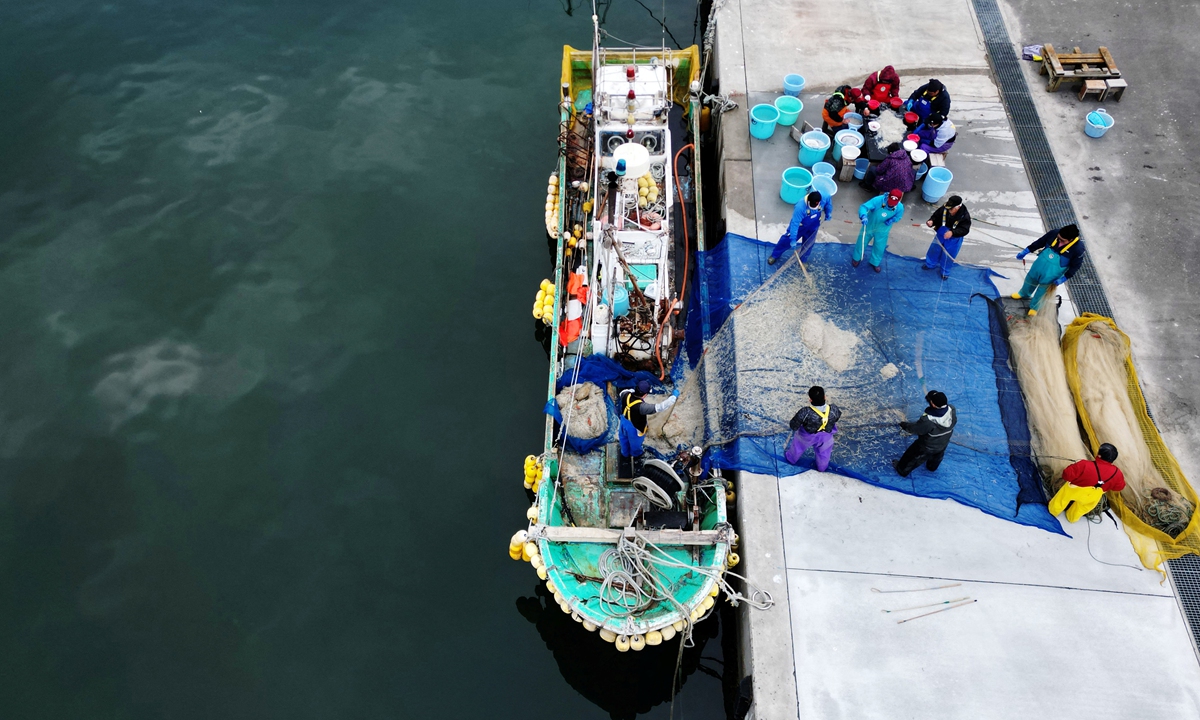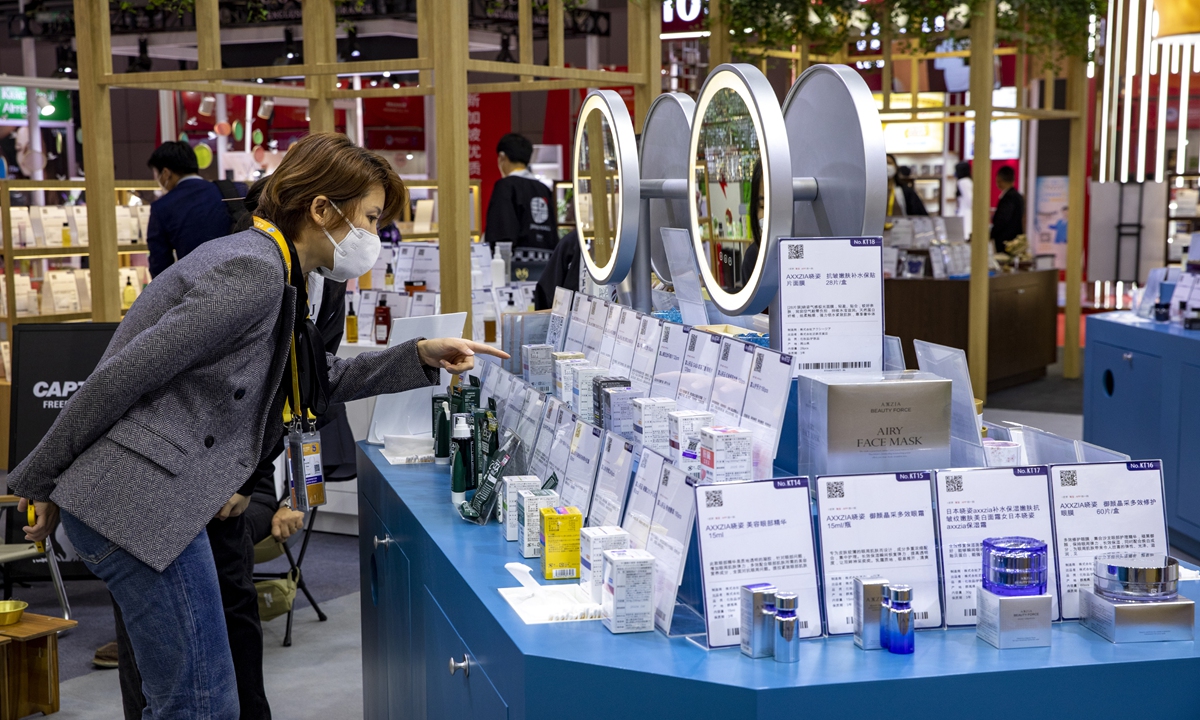
Local fishermen wash noodle fish to be sold later on at a fishing port in Shinchimachi, about 55 kilometers away from the disabled Fukushima Daiichi nuclear power plant, in Fukushima Prefecture, Japan, on March 2, 2023. Photo: IC
Grace Ruan browses the pages of a shopping website and plans to order baby congee for her one-year-old son. This is a popular Japanese-brand congee that Ruan has bought many times.
But this time she hesitates for a while. She reminds of the alarming media reports about Japan's nuclear-contaminated wastewater dumping plan, the baby congee's country of origin.
Ruan, nonetheless, places the order after careful consideration, as she believes the dumping plan won't affect most Japanese-made products any time soon. "But I may abandon Japanese baby products in the future, maybe after three or four months," the young mother told the Global Times.
Japan plans to start dumping the radiative wastewater as early as the end of this month, and the dumping period may last over 30 years, Japanese mainstream media revealed. This irresponsible move has caused panic among residents in Japan's neighboring countries and regions.
Apart from Ruan, many Chinese parents reached by the Global Times in recent interviews said that they may no longer buy Japanese baby products, which "are likely to be contaminated by nuclear radiation" because of Japan's forthcoming dumping of
poorly treated wastewater.
They currently have mixed feelings about Japanese products. "I like the products. But I don't want to risk my baby's health," a mother sighed.
How will the Pandora's Box that the Kishida administration plans to open harm the country's business enterprises? Global Times reporters reached Chinese and Japanese consumers and businesspeople, who shared their concerns and pessimisms about the reckless decision.
Mounting worries
Ruan used to be a big fan of Japanese products. From camera to skincare products, from instant noodles to baby's feeding bottles, Ruan's home is filled with various kinds of Japanese-brand items.
"I think Japanese products are of good quality, and most products suit our Chinese customers probably because China and Japan are in the same [East Asia] region," Ruan praised.
However, Ruan started to get in touch with more news of the scheduled nuclear-contaminated wastewater dumping early this year. She has searched related information, and found that the wastewater to be dumped by the Japanese government may not meet with the set release standards, and that may lead to a series of unpredictable consequences.
"I personally don't worry too much about Japanese products," she said. "But I have to think of my baby. I may buy him Western- or Chinese-made [products] instead."
Similar to Ruan, many other Chinese mothers told the Global Times that they are anxious about how the planned wastewater dumping may affect the baby products they use regularly, which include but are not limited to disposable diapers, feeding bottles, body oils, prewalkers, and foodstuffs.
A mother nicknamed Lapin recalled that she once found a Japanese-brand baby bottle cleaner on sale at a very attractive discount, but she didn't buy it. "I don't buy any Japanese baby products now," Lapin said.
Such panic and concern has also spread online. On Chinese social media platforms like Xiaohongshu, or little red book, there are many posts that mainly list Japanese skincare, food, baby, and daily product brands, calling for people to no longer buy the listed items due to "possible safety concerns." Many big brands that are familiar to Chinese customers, such as Shiseido, Kao, Suntory, Lion and Pigeon, are usually on these lists.
Many netizens have commented under the posts, either asking for alternative brands from other countries, or slamming Japanese government's shameful move. "The radionuclides in the wastewater can be a great harm to marine organism, and will gradually harm humans," one user wrote on Xiaohongshu. "Why must we pay for their wrongdoing?"
Some nervous customers have even reached out to Japanese brand customer service representatives requesting to be furnished with a nuclear radiation monitoring report for the products they have bought, but the result was not satisfactory most of the time.
A customer in Shanghai, for instance, recently asked for a monitoring report for a Japanese bath cream she bought in July via an online overseas shopping platform.
"The report the customer service representative sent to me was made as early as January, and it can only vouch that the bath cream's packing has no nuclear radiation," she told the Global Times. "That was far from reassuring to me."
'A crushing blow' to seafood industryFrom big companies to small business ventures, Japanese businesses have become one of the biggest victims of the country government's
hasty and unreasonable nuclear-containment wastewater release plan.
Those engaged in the food industry, particularly in seafood, have been the first to suffer the effects. Customs in the Chinese mainland and Hong Kong Special Administrative Region announced a ban on the importation of food products from 10 of Japan's 47 prefectures due to safety concerns in July.
Chinese mainland customs authorities said they would also strictly review documents regarding foodstuffs, especially aquatic products.
Japanese Agricultural Minister Tetsuro Nomura told media in late July that some fishery exports from Japan have been suspended by Chinese customs authorities, and complained that such strict measures were "unacceptable."
"Of course, China would put pressure on Japan as a display of a tough stance, which means that since Japan can ignore the health of the people of coastal countries and the potential for pollution to the ocean, the affected countries also have the right to increase sanctions against Japan," Da Zhigang, director of the Institute of Northeast Asian Studies at the Heilongjiang Provincial Academy of Social Sciences, told the Global Times.
At a press briefing in July, Chinese Foreign Ministry spokesperson Mao Ning urged Japan to "heed the call of the international community, stop pushing through with the discharge plan, engage in full and sincere consultations with its neighbors, dispose of the nuclear-contaminated wastewater in a responsible way, and accept rigorous international oversight."
Besides the Chinese mainland and Hong Kong, the first and second largest export destinations of Japan's aquatic products in 2022 which, together, accounted for some 40 percent of its overall aquatic exports, dozens of countries and regions have announced to ban on food products from Fukushima and its surrounding areas.
South Korea, for instance, said that it will stick to its ban on seafood imports from Japan's Fukushima region, as the issue of people's health and safety is something that the "government can never compromise on," the Yonhap News Agency reported on June 21.
The bans have dealt a crushing blow to the Japanese industries and regions involved.
Junichi Tamatsukuri, a Japanese lawmaker from Ibaraki Prefecture, which borders Fukushima, told the Global Times that if the nuclear-contaminated wastewater from Fukushima is dumped into the sea this time, many industries in his prefecture, such as fishing, agriculture, manufacturing, and tourism, would be affected.
"It [Fukushima] used to be a treasure house for fresh and delicious seafood," said Haruo Ono, a fisherman from the town of Shinchi in Fukushima. "For fishermen living in such island countries, the sea is our god."
"But if the nuclear-contaminated wastewater is dumped into the sea at a time when the fishing situation in Fukushima has just improved, the efforts from the last 12 years will be wasted," Ono said angrily. "This is devastating for the Fukushima fishing industry."
The industry's downstream is at a low ebb as well.
In Shanghai's downtown area is an omakase restaurant in operation for more than 20 years whose owner and chief cook is a Japanese man who likes to send WeChat messages to his regular customers at times, inviting them to try the newly arrived seafood flown in from Japan, such as sea snails and sea urchins.
From late July, his messages started to conclude with the same sentence: The seafood our restaurant uses doesn't come from the regions China has banned.
In a phone conversation, the restaurant promised the Global Times that ingredients used at the establishment have no radiation risk. "They are from Japanese regions like Hokkaido that are far from the 10 banned prefectures, and undergo hours of extensive inspection at customs," a staffer expertly said, as though she had explained this fact to customers dozens of times.
The staffer acknowledged that the restaurant has been "somewhat affected" by the dumping plan while declining to give further details.
Similarly, according to Wang, a Shanghai resident who enjoyed a buffet at a Japanese restaurant on Saturday night, the restaurant's customer flow had fallen "by half."
The buffet restaurant in the Pudong New Area used to be so popular that there would routinely be long lines of diners waiting at the door as early as 4 pm at weekends, "but that day no one was waiting outside even during dinner time," Wang recalled to the Global Times.

Customers experience Japanese cosmetics at a both on the fifth China International Import Expo (CIIE) in East China's Shanghai, on November 8, 2022. Photo: IC
Antipathy sentiment spreadsAlso a casualty of the nuclear-contaminated wastewater dumping plan, Japan's cosmetics industry has also been hard hit in the Chinese market, one of its biggest overseas markets.
Several Japanese cosmetics companies reportedly suffered slumps in stock prices after an increase antipathy toward the dumping plan and warnings issued against the use of Japanese products which has spread across Chinese social media, observers found.
Cosmetics giant SHISEIDO saw a 6.8-percent plummet in stock prices in June, "the biggest weekly drop in nearly 10 months," the Singapore media outlet Lianhe Zaobao reported on June 24. It added that the share prices of other cosmetics manufacturers in Japan, including Pola Orbis Holdings and Kosé, also fell more than 3 percent that month.
China has always been an important market for Japanese exporters in various industries.
"However, although these import and export enterprises have complaints and criticisms [against their government], they cannot control the government's mandatory emissions," Da said.
Even if some neighboring countries have not banned these Japanese products, public sentiment that these products may pose certain risks has gained traction, making consumers more cautious when choosing, he told the Global Times.
More than
80 percent of respondents in 11 countries in the Asia-Pacific region, except for Japan, said Japan's plan to dump nuclear-contaminated wastewater into the sea is "irresponsible," nearly 90 percent of respondents expressed negative sentiments toward the plan, and 94 percent said the move would have a negative effect not only on Japan and Pacific Rim countries but also on the rest of the world, a survey conducted by the Global Times Research Center found.





